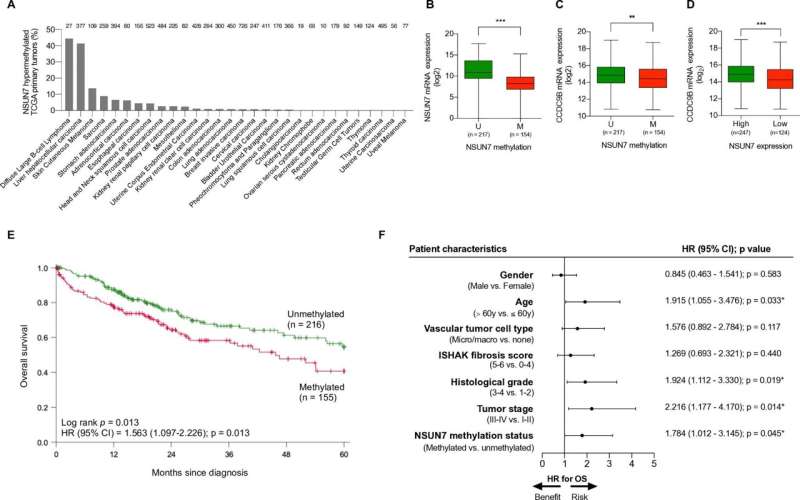This article has been reviewed according to Science X's editorial process and policies. Editors have highlighted the following attributes while ensuring the content's credibility:
fact-checked
trusted source
proofread
Epigenetic mechanism associated with clinical outcome and therapeutic vulnerability in liver cancer

Researchers at the Josep Carreras Leukemia Research Institute, led by Dr. Manel Esteller, have discovered a key epigenetic alteration that anticipates the clinical course of liver cancer. This is the deactivation of the NSUN7 gene, which is an epigenetic editor of RNA. Tumors with this alteration tend to have a poor clinical prognosis, although the research indicates that they are more vulnerable to bromodomain inhibitors, a family of anticancer drugs.
Liver cancer is a very frequent type of tumor, in fact in many countries it is among the three most commonly detected. In addition to its high incidence, with around one million cases diagnosed each year worldwide, it is a type of tumor that is highly aggressive, with a mortality rate of about 80% of patients.
The group of Dr. Manel Esteller, Director of the Josep Carreras Leukemia Research Institute, ICREA research professor and professor of genetics at the University of Barcelona, has experience in the study of liver cancer, as they were the first to determine the epigenome of this tumor and thus identify the main chemical alterations in the DNA that change its genetic expression.
In the research, written by Vanessa Ortiz-Barahona and Marta Soler as lead authors and published in Molecular Cancer, the scientific team has focused on the study of chemical modifications on RNA, the intermediary molecule between genetic information and proteins, the real tools of the cell. In this sense, Esteller emphasizes that "in the last five years, we have contributed to demonstrate that not only the chemical regulation of DNA is altered in cancer but also the 'marks' that control the activity of ribonucleic acid (RNA)."
During the study about what controls these chemical modifications of RNA (the so-called epitranscriptome), the researchers found that the NSUN7 gene was clearly altered in liver cancer. "We observed that the NSUN7 gene suffered a loss of functionality in liver tumors and this led to a degradation of its RNA targets, ultimately leading to a superactivation of the MYC oncogene," says Dr. Esteller.
Oncogene activation is usually associated with worse survival, as the results of the study showed. However, Esteller comments that "at the same time we found that the aforementioned tumors were more sensitive to drugs that block MYC, such as the so-called bromodomain inhibitors," opening up a new therapeutic avenue worth exploring in clinical trials of liver cancer depending on the activation status of NSUN7.
An unforeseen consequence that emerges from the research is that those liver tumors with intact NSUN7 might be more receptive to immunotherapy. Thus, determining the epigenetic status of NSUN7 in liver cancer patients could be of high clinical value and help to design a more precise and personalized therapy for the patient.
More information: Vanessa Ortiz-Barahona et al, Epigenetic inactivation of the 5-methylcytosine RNA methyltransferase NSUN7 is associated with clinical outcome and therapeutic vulnerability in liver cancer, Molecular Cancer (2023). DOI: 10.1186/s12943-023-01785-z



















